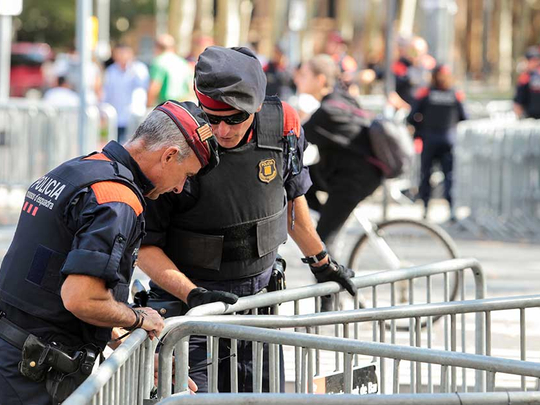
BARCELONA, Spain: Police on Tuesday blocked public access to a Barcelona park where Catalonia’s parliament is located ahead of an address by the region’s leader who may declare independence.
“For security reasons, Parc de la Ciutadella is closed to the public today,” Catalonia’s regional police force, the Mossos d’Esquadra, said in a Twitter message.
The goal is to “prevent any situation that would put pressure on parliamentary activity”, a police spokesman said.
During a massive rally in Barcelona on Sunday against independence “a group of people forced their way into the park and threw objects against the parliament building,” he added.
“We are trying to avoid these situations, both on the part of pro-unity protesters as well as by groups of radical separatists,” the spokesman said.
Police set up metal barriers at the entrance to the park and several blue police vans were parked outside of the parliament building.
During a protest held in July 2011 against austerity measures, demonstrators surrounded the parliament building, a former military arsenal, and several regional lawmakers were harassed as they tried to enter.
The head of the regional Catalan government at the time, Artur Mas, was forced to enter the building by helicopter.
Catalonia’s main separatist organisations had called for supporters of Catalan independence to gather in front of the parliament “to support and defend the declaration of independence.”
They will now gather outside of the park instead.
Catalan leader Carles Puigdemont is scheduled to address the parliament at 6:00pm (1600 GMT) after his government pushed ahead with a banned independence referendum on October 1.
Some 2.3 million Catalans — or 43 per cent of the electorate in the north-eastern region — turned out to vote in the Oct. 1 independence referendum, which the Spanish government said was illegal. Regional authorities say 90 per cent who voted were in favour and declared the results of the vote valid.
The ballot was marred by violence as riot police tasked with stopping the voting clashed with voters, leaving hundreds injured.
The political deadlock has been compared in Spain to a “train collision” and has plunged the country into its deepest political crisis in more than four decades, since democratic rule was restored following the dictatorship of Gen. Francisco Franco.
In the streets of Barcelona, expectations were divided between those who want to see the birth of a new nation and others opposed to the idea. Some feared a drastic backlash from the Spanish central authorities.
“I am thrilled,” said Maria Redon, a 51-year-old office worker. “I’ve been waiting for this all my life. We have fought a lot to see an independent Catalonia.”
But Carlos Gabriel, a 36-year-old waiter, said that is “impossible.”
“He won’t do it. By doing so he would be diving into an empty pool,” he said referring to Puigdemont’s parliamentary address. “These people know it’s just a dream. Something very complicated. Something that will carry many negative consequences for all of us.”
In Catalonia and elsewhere in Spain, people were reading between the lines of politicians’ statements to try to figure out what’s next.
Regional government spokesman Jordi Turull refused to comment on what Puigdemont’s address would be about during a press conference on Tuesday.
The Catalan parliament’s governing board acknowledged Tuesday morning it had received the results in last week’s disputed independence referendum. But a parliamentary official who spoke on condition of anonymity said the board refrained from putting the results through normal parliamentary procedures to elude any legal problems, because the referendum and its legal framework have been suspended by the national Constitutional Court.
Assemblea Nacional Catalan and Omnium Cultural, two of the main civil society organisations driving the secession bid, have called for people to gather near Barcelona’s parliament building to back the regional government in “welcoming the republic.”
Hundreds of thousands have turned out for street protests in Barcelona and other towns in the past month to back Catalan independence and protest against alleged police violence during the vote. Those committed to national unity have also staged separate, large-scale rallies.
The tension has impacted the economy, with dozens of companies already relocating their corporate address away from the troubled region to remain under Spanish and European laws if Catalonia manages to secede. The moves of the firms’ bases do not so far affect jobs or investments — but they don’t send a message of confidence in the Puigdemont government.
Spain’s Economy Minister Luis de Guindos said on Tuesday he hoped “common sense” would prevail and blamed Puigemont’s “radical” and “irresponsible” government for the current standoff.
“This is not about independence, yes or no. This is about a rebellion against the rule of law,” de Guindos told reporters in Luxembourg, where he was meeting with European Union ministers. “And the rule of law is the foundation of coexistence, not only in Spain but in Europe.”












